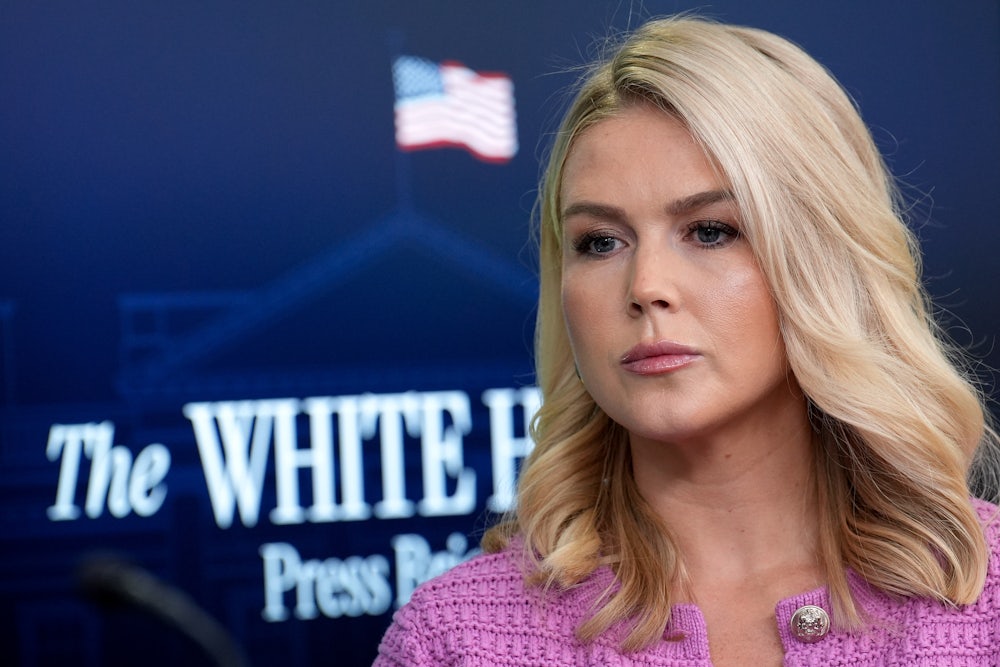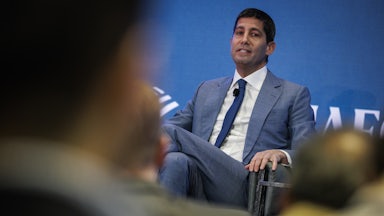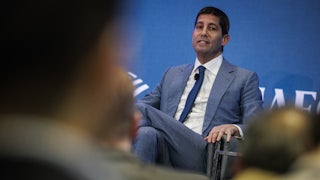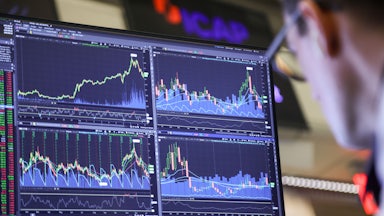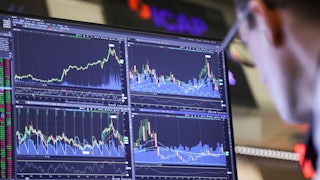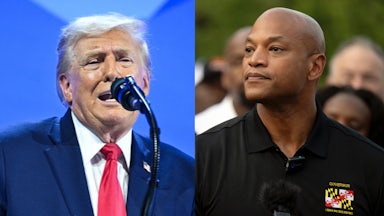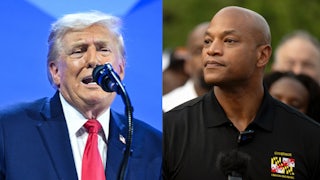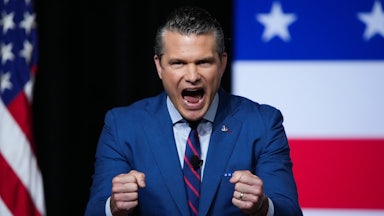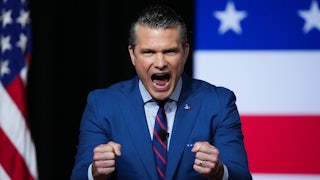Well, that was fast. On Tuesday morning—after the news broke that Amazon was supposedly planning to display the costs that President Trump’s tariffs are adding to the price of products—White House press secretary Karoline Leavitt issued a dark warning.
“This is a hostile and political act by Amazon,” Leavitt told reporters, pointedly noting that she had just heard this message straight from the Big Man himself. Less than two hours later, Amazon put out a statement clarifying that this idea was only considered in a small corner of its sprawling online retail empire and “was never a consideration for the main Amazon site.”
You might be tempted to see this as another sign of Trump’s fearsome strength: He merely hinted at unleashing the power of the government on Amazon, a company worth $2 trillion, and it immediately fell into line, right?
Naah. This little saga is better seen as highly revealing of Trump’s weakness right now, both on tariffs specifically and more generally. The last thing that Trump and his propagandists can tolerate is the spectacle of voters being told basic facts about his tariffs.
Which puts Trump at the mercy of those who will tell the truth about them.
Leavitt’s broadside against Amazon is telling in this regard. First, watch the whole thing, courtesy of Aaron Rupar:
REPORTER: Amazon will soon display a number next to the price of each product that shows how much the Trump tariffs are adding. Isn't that a perfect demonstration that it's the American consumer who is paying for these policies?
— Aaron Rupar (@atrupar) April 29, 2025
LEAVITT: This is a hostile and political act by… pic.twitter.com/oewT08hBSH
Note that Leavitt didn’t answer the second half of the reporter’s question. Isn’t the idea that Amazon might label the cost of tariffs, the reporter asked, a “crystal clear demonstration” that the American consumer, and not China, will have to “pay for these policies”?
Leavitt unloaded aggressively in response, describing this as a “hostile” act, not once but twice—signaling that Trump would view this as meriting “hostile” action by the government in return. That may have gotten short-term results: Whatever Amazon’s original intentions, it did quickly announce a stand-down.
But the careful observer will notice a problem with Leavitt’s approach. It’s that people are still going to have to pay higher prices for these tariffs on an enormous range of consumer products, whether Amazon labels them as such or not. And the ability of the White House to manage this problem—either by browbeating the private sector into not raising prices or by flooding Americans with propaganda about how “other countries” are the ones paying the tariffs in a much-needed global rebalancing—is actually quite limited.
Recall that during a private call with the CEOs of big automakers last month, Trump darkly warned that they’d better not raise prices in response to his tariffs. The White House will look unfavorably on any companies that do this, he suggested, leaving them fearing retribution.
Amusingly, all this really did was reveal that Trump himself knows that importers and domestic manufacturers using imported parts—and not “other countries”—are the ones who will pay the tariffs. Since then, there have been no indications that automakers will be bullied into swallowing the costs of Trump’s tariffs. Indeed, the White House just announced some tariff relief for them, an apparent backing down.
Meanwhile, out in the real world, the impacts of Trump’s tariffs are already glaringly obvious. A dozen top retailers, including Shein and Target, announced just this week that Trump’s tariffs are translating into higher prices. Shipments to the port of Los Angeles are starting to dry up. Layoffs are beginning to hit, including deep in MAGA country.
Trump’s spinners have boundless faith in their power to recast the battle over tariffs as one allying him with regular people against corporate elites. This was clearly the calculation behind the Trump-Leavitt effort to pick a public fight with Amazon over the possibility that the company might be too truthful with consumers about them.
But the tariffs, as an issue, are uniquely positioned to cut through that kind of agitprop, and a new poll from CNN demonstrates why. It finds that a whopping 60 percent of Americans now say Trump’s policies have already increased the cost of living and 55 percent say his tariffs are “bad policy.”
What’s remarkable, though, is that large percentages of working-class respondents also view the tariffs dimly. The numbers among non-college voters—a standard metric of class—are striking: 57 percent say Trump’s measures have already increased the cost of living; 50 percent say the tariffs are bad policy; 55 percent say he doesn’t have a clear strategy with them; 69 percent say they’ll hurt the economy in the short term; and 50 percent say they’ll hurt it over the long term.
In short, Trump’s propagandists cannot easily polarize the tariffs along elite versus non-elite lines. And as that last data point suggests, there’s no sign that working-class voters see a need for the massive rebalancing—via an unwinding of globalization—that Trump keeps insisting we need. This is why you see opposition brewing even in deep-red places like Texas. People think Trump’s tariffs are bad, full stop, because they see it with their own eyes. And it isn’t just that they fear higher prices in the immediate term. It’s also that they view the superficial nationalist project underlying them dimly as well.
So there’s an opening here for others to step into the breach that Amazon left by announcing it will not inform consumers about tariffs’ actual costs. Why can’t other retailers—ones large and small, ones not easily cowed by Trump—run with the idea? Why not do Amazon one better and explicitly label the additional costs heaped on consumer goods as the direct result of Trump’s tariffs? Slap his name right on those added costs, just as Trump put his name on those 2020 stimulus checks.
OK, I get that this idea might run into some practical difficulties. Smaller retailers can’t inform all that many consumers with a move like this. But it’s the sort of thing that could generate a little cultural boomlet if it got going. It might spread. Companies that don’t fear MAGA boycotts—or want to bond with anti-Trump customer bases—might have a little fun and get creative.
Just look how infuriated Trump grew at the prospect of one company—admittedly a giant and influential one, but still—telling consumers the truth about his policies. The wildly disproportionate response to Amazon from Trump and Leavitt wasn’t a sign of strength and power. It was a display of deep, enduring weakness, just waiting to be exploited.
